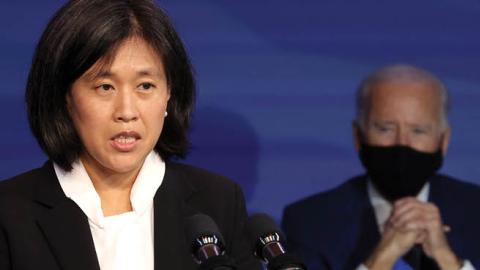China came up a lot during Katherine Tai’s nomination hearing to become U.S. Trade Representative for the Biden administration. This shouldn’t come as a surprise. China is a bipartisan issue in Congress. Tai acknowledged China has long been an issue for past trade representatives and offered that her team would explore all their options to deal with China’s illiberal economic practices.
She also noted that China made a commitment when it signed the U.S.-China Phase One agreement early last year. However, a lack of purchases made by China and a global pandemic means the deal will need to be renegotiated. The U.S.-China trade deal hasn’t been a complete failure. To date, there’s been several statements from U.S. officials highlighting the deal’s achievements. But the deal isn’t a complete success either. In 2020, China (specifically, government and private purchasers within China) failed to buy over $200 billion worth of American goods and services that were specified in the deal.
China was meant to purchase more of certain American-made goods like soybeans, crude oil, and semiconductors, though the deal left out things like American-made airplanes or optical equipment. The deal also laid out the specific value of goods and services to be purchased. So far, China has only managed to import 63 percent of the goods it was supposed to. China will likely only manage to import 53 percent of the services. This will be a problem for American and Chinese trade negotiators.
It’s fair to say the disruptions the pandemic caused for both the American and Chinese economies had a lot to do with China’s failure to buy more goods. Even the former trade representative and negotiator of the deal recognized this. But there was also fair skepticism whether China would (or could) buy all these goods and services to begin with.
Now, even if China had no means to make all these purchases to begin with, it can blame its failures on the pandemic. The pandemic, an unforeseeable event for sure, now gives American and Chinese negotiators a chance to review the terms of deal. The deal states that in the event of a natural disaster or unforeseeable event that negotiators can consult with one another.
Negotiators will need to discuss why China failed to make its purchases and come up with a solution. That or withdraw from the deal altogether. President Biden wants to consult with allies first to come up with a comprehensive China strategy. But there are two outstanding problems with the deal that allies might not be able to fix.
First is the legal issue that was created by the trade war. The Trump administration’s abuse of tariffs was a violation ignored by Congress for years. Last year, over 3,000 companies filed a lawsuit against the administration for its abuse of tariffs. And now the Biden administration will have to deal with the legal consequences.
Second is the fact that Americans are still paying these tariffs – not our allies, and certainly not China. Almost $78 billion has been collected from Americans since the trade war began. That breaks down to roughly $600 per household.
A few billion collected in tariff duties a month can add up quickly. Meanwhile, many Americans are still unemployed. Hopefully, President Biden and his trade team don’t wait too long before they figure out it’s time to renegotiate this broken deal.
Read in The Hill















